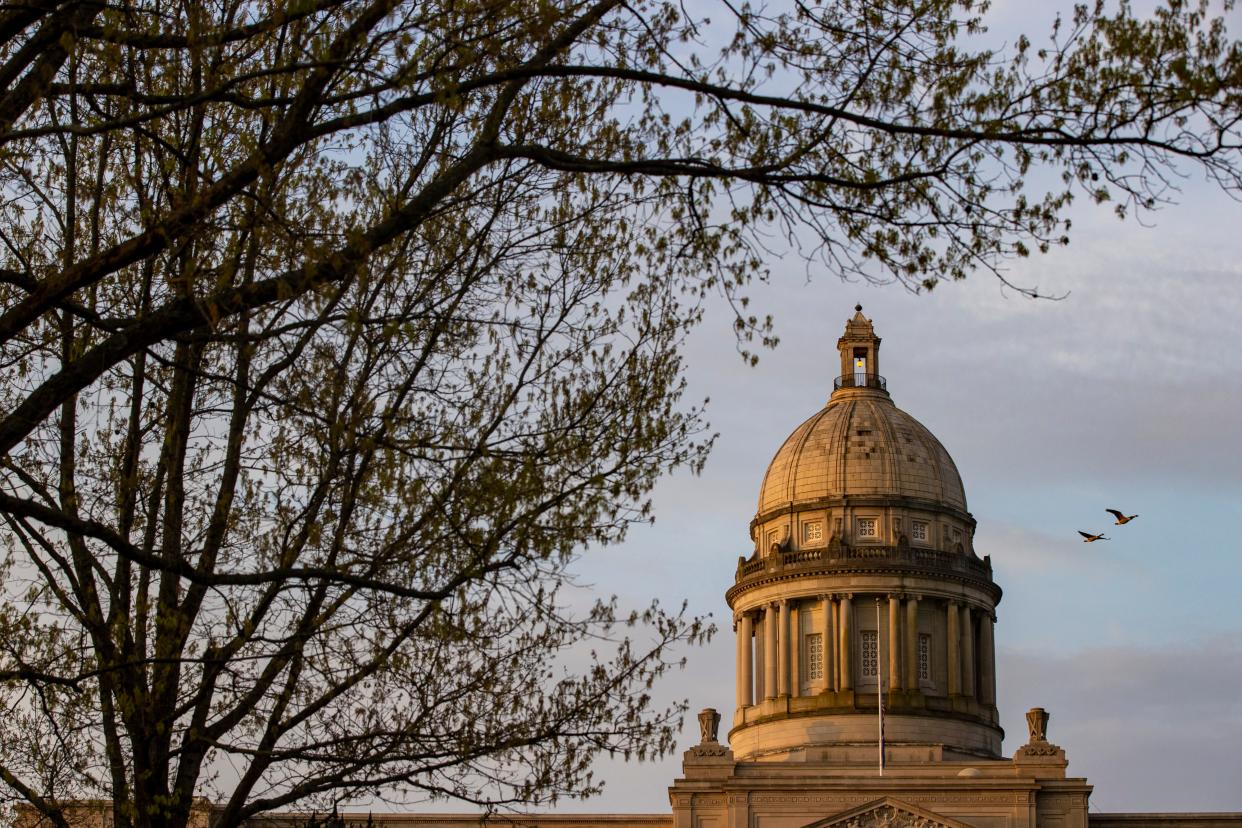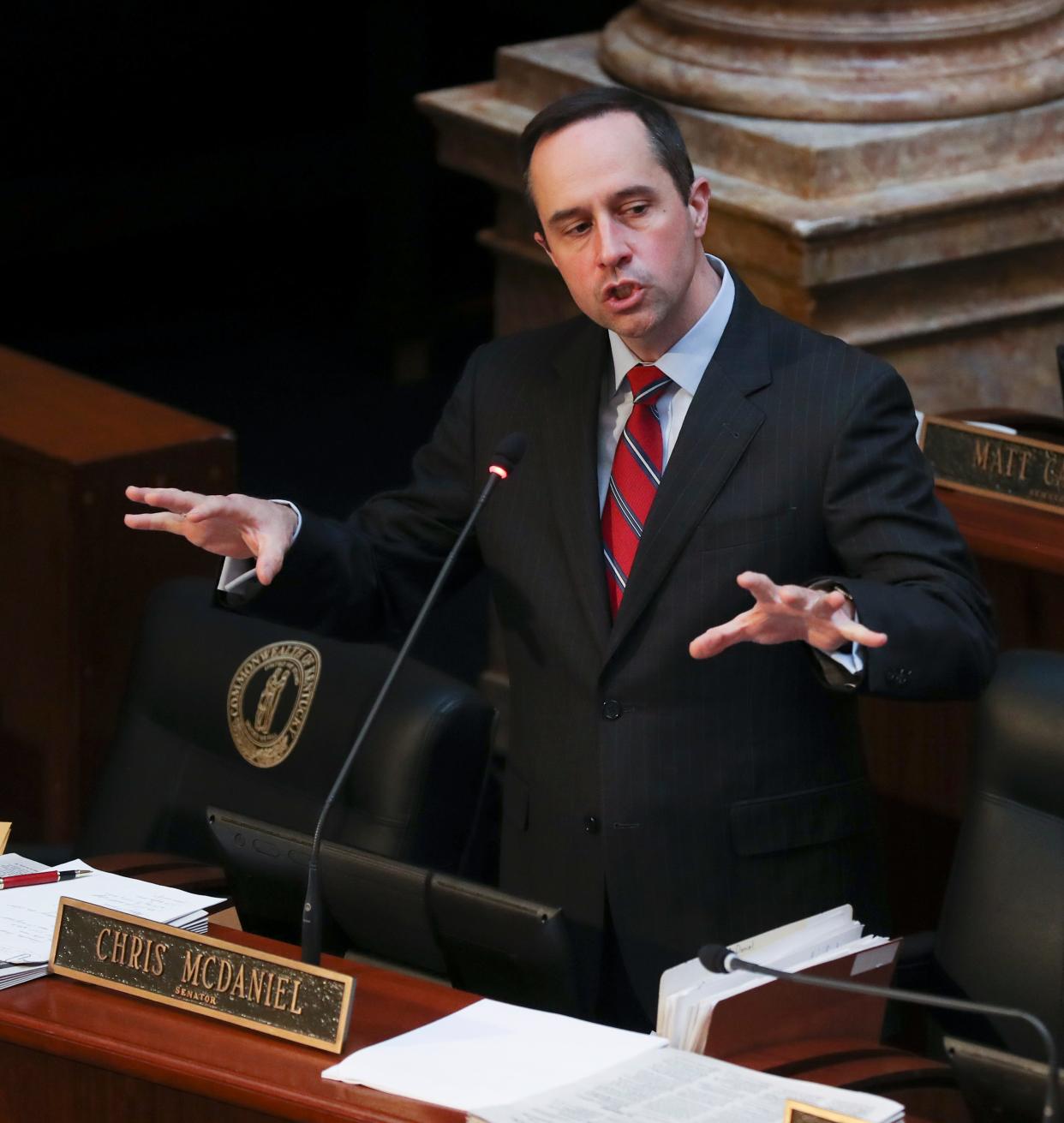2-year budget, tax rebates, tax reform: Here's where things stand in Kentucky legislature

FRANKFORT — Nearly two months after House Republicans' two-year executive branch budget plan cleared that chamber, the Senate on Wednesday finally took up and passed their amended version of the bill with some significant changes.
The two-year budget is expected to go to a conference committee next week where Republican leadership of each chamber can hash out their differences — with the Kentucky General Assembly quickly approaching the beginning of the governor's veto period in three weeks.
A major factor that will influence the final form of this state budget bill is the presence of two GOP tax bills that have cleared their respective chambers — a Senate bill giving just over $1 billion of rebates to tax filers, and a House bill cutting the individual income tax rate from 5% to 4% next year and expanding business services subject to the state sales tax.
Kentucky General Assembly: Governments, colleges may be barred from asking workers, students about COVID shot status
Those tax bills may also change further as the Republican supermajority tries to find consensus on how much in projected surplus revenue should go unappropriated and how the large tax rebates or tax cuts should be.
Here's a look at the content of each of these three budget and revenue bills and their path ahead in the legislation through the end of March:
Senate budget spends less than House
While House Republicans left just more than $1 billion unappropriated over the biennium to leave room for tax reform, the amended HB 1 cleared by the Senate budget committee Wednesday morning and the full chamber later that day left $2.3 billion unspent.
When accounting for the $1 billion of tax rebates to go out this summer if Senate Bill 194 passes into law — it has cleared the Senate and not been taken up by the House — this would leave nearly $1.3 billion unappropriated after the 2024 fiscal year.
While the Senate version of the two-year state budget would spend considerably less, it does increase spending over the House version in a number of areas, including a 10% average raise for state workers instead of a 6% raise.
The Senate budget spends a few hundred million less on K-12 education than the House, including eliminating the House proposal to continue funding full-day kindergarten statewide.
Death penalty, Braidy, frivolous lawsuits:10 bills to watch in the Kentucky legislature
The Senate's version of HB 1 would also spend about $60 million less on covering local school districts' transportation costs, though it would spend $15 million over the biennium on school mental health providers, for which the House provided no funds.
The Senate added $250 million for the renovations of state parks, but also made a significant reduction in public pension payments. While the Senate's HB 1 pays the full actuarially recommended employer contributions, it provides $200 million less than the House for the Kentucky Employees Retirement System's non-hazardous plan and $142 million less to the Teachers' Retirement System.
The Senate would appropriate an additional $250 million to the state's rainy day fund, growing it to $1.75 billion — close to what was left by House Republicans.
Both the House and Senate version spent far less that the budget proposal of Gov. Andy Beshear, who called for appropriating all projected revenue — in total nearly $3 billion more than the Senate — while also increasing the rainy day fund.
Sign up: On Kentucky Politics newsletter delivered to your inbox weekly
Beshear had called for much of this funding to go to public education, appropriating funds for universal pre-kindergarten for the first time and mandating raises for teachers and school personnel — calling the huge surplus projected in the current and future fiscal year an opportunity to make historic investments.
Senate Minority Leader Morgan McGarvey, D-Louisville, objected to the quick passage of the bill at the Wednesday morning committee meeting, as Democrats had still not received a copy of the bill, saying "that is not the way to do business in Frankfort."
How far can tax reform go?
Republican leadership signaled in January they would move quickly to pass a state budget so they get down to tax reform — figuring out how much is available to give back in tax relief.
The size of the tax relief offered by Senate Republicans in SB 194 and House Republicans in House Bill 8 will ultimately depend on how much is left unappropriated in the final version of HB 1, as the state constitution mandates a balanced budget.
While SB 194 would direct just more than $1 billion in tax rebates, a new fiscal note for HB 8 indicates it would decrease revenue by $463 million in the next fiscal year and an additional $901 million in the first full fiscal year of implementation in 2023-24.
If both are passed and that fiscal note remains accurate, this would amount to a hit to the budget of roughly $2.4 billion — slightly more than the unspent funds in the Senate budget and well over $1 billion more than what the House budget left over.

Senate budget committee chairman Chris McDaniel, R-Taylor Mill, who crafted their HB 1 changes, said if both tax bills are passed this would likely mean either additional cuts would need be made or less money directed to the rainy day fund in order to get to a balanced budget.
"Once we get this sent back over the House, we will really begin some more talks (on tax reform) in earnest at that point," McDaniel said.
What's next?
Once HB 1 heads to the House, they will set up a conference committee of members in both chambers so Republicans can come to consensus on a budget.
McDaniel expects this process to begin next week, with Republicans needing to pass a bill before midnight on March 30 — the last day before the governor's 10-day veto period. If the governor vetoes a budget bill in that period, the Republican supermajority is likely to easily override that veto once they return for the final two days of the session on April 13-14.
As for the two tax bills, SB 194 has not yet been taken up by the House budget committee, and HB 8 has not yet been taken up by the Senate budget committee.
Rent: More money is coming to help Louisville renters. But you need to apply soon!
While Republicans have full control of the process going forward, they'll still have a push and pull behind the scenes on which appropriations remain and the final version of tax reform.
Jason Bailey, the executive director of left-leaning thinktank Kentucky Center for Economic Policy, said the Senate version of HB 1 passed Wednesday "doesn’t just repeat many of the same mistakes and miss out on many of the same opportunities as the House," but "proposes to take an even bigger step in the wrong direction."
"If such a budget is paired with permanent tax cuts, as the House has proposed, this budget’s glaring lack of needed investments would be worsened by the massive revenue holes that would be created in future budgets.”
Reach reporter Joe Sonka at jsonka@courierjournal.com and follow him on Twitter at @joesonka. Support strong local journalism by subscribing today at the top of this page.
This article originally appeared on Louisville Courier Journal: Here's where Kentucky's budget and tax reform bills stand
